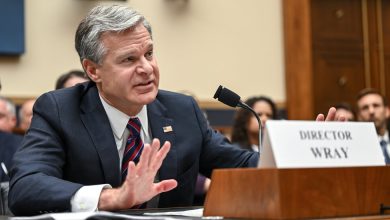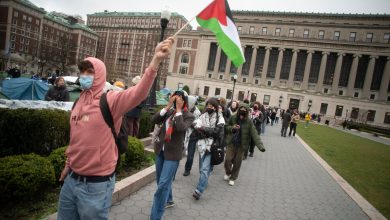Russia dismissed a U.N. Security Council meeting as an American P.R. stunt.

Russia on Friday denounced a scheduled U.N. Security Council meeting on Ukraine as a “clear P.R. stunt” orchestrated by the United States, and signaled Moscow’s intent to derail it. American officials expressed confidence that the meeting, planned to be broadcast live on Monday, would proceed.
The meeting of the Security Council, the most powerful U.N. body, was requested by the United States in response to Russia’s buildup of military forces along Ukraine’s borders.
The Americans and their NATO and Western allies see the buildup as a prelude to a possible invasion, which they call a violation of core U.N. principles that have helped avoid major global armed conflicts for more than seven decades.
Russia has said it has no intention to invade Ukraine but wants promises that its neighbor will never join NATO, and that the Western alliance will pull forces from Eastern Europe, which the Russians call a threat to their own security.
Russia’s objection to the Security Council meeting came from Dmitry Polyanskiy, its deputy permanent representative at the United Nations, who in a Twitter posting ridiculed the idea, which was announced Thursday by the American ambassador, Linda Thomas-Greenfield.
Understand Russia’s Relationship With the West
The tension between the regions is growing and Russian President Vladimir Putin is increasingly willing to take geopolitical risks and assert his demands.
- Competing for Influence: For months, the threat of confrontation has been growing in a stretch of Europe from the Baltic Sea to the Black Sea.
- Threat of Invasion: As the Russian military builds its presence near Ukraine, Western nations are seeking to avert a worsening of the situation.
- Energy Politics: Europe is a huge customer of Russia’s fossil fuels. The rising tensions in Ukraine are driving fears of a midwinter cutoff.
- Migrant Crisis: As people gathered on the eastern border of the European Union, Russia’s uneasy alliance with Belarus triggered additional friction.
- Militarizing Society: With a “youth army” and initiatives promoting patriotism, the Russian government is pushing the idea that a fight might be coming.
“I can’t recall another occasion when a SC member proposed to discuss its own baseless allegations and assumptions as a threat to intl order from someone else,” he wrote. “Hopefully fellow UNSC members will not support this clear PR stunt shameful for the reputation of UN Security Council.”
As one of the five permanent members of the 15-nation council, Russia enjoys veto power over its decisions, making it all but certain that the body will take no action on the dispute. But permanent members cannot veto the scheduling of meetings, which would require a nine-vote majority.
Senior Biden administration officials, speaking via conference call to reporters on condition of anonymity, said they were sure that Russia lacked the votes to derail the meeting.
“We are confident that there is broad support across the council for this meeting,” one of the officials said, “more than sufficient support for having this conversation.”
Another described the meeting as “a really important opportunity for all the world’s powers to be on the record on whether they see a path to diplomacy or a path toward conflict.”
Though there is no expectation of any formal action to criticize Russia’s behavior, an open debate in the Security Council, broadcast live on the United Nations website, could potentially expose Russia to embarrassing isolation.
Ms. Thomas-Greenfield said in a statement on Thursday that the United States, in consultation with other unspecified members of the council and with Ukraine, had requested the meeting “to discuss a matter of crucial importance to international peace and security: Russia’s threatening behavior against Ukraine and the buildup of Russian troops on Ukraine’s borders and in Belarus.”
Understand the Escalating Tensions Over Ukraine
A brewing conflict. Antagonism between Ukraine and Russia has been simmering since 2014, when the Russian military crossed into Ukrainian territory, annexing Crimea and whipping up a rebellion in the east. A tenuous cease-fire was reached in 2015, but peace has been elusive.
A spike in hostilities. Russia has recently been building up forces near its border with Ukraine, and the Kremlin’s messaging toward its neighbor has hardened. Concern grew in late October, when Ukraine used an armed drone to attack a howitzer operated by Russian-backed separatists.
Ominous warnings. Russia called the strike a destabilizing act that violated the cease-fire agreement, raising fears of a new intervention in Ukraine that could draw the United States and Europe into a new phase of the conflict.
The Kremlin’s position. President Vladimir V. Putin of Russia, who has increasingly portrayed NATO’s eastward expansion as an existential threat to his country, said that Moscow’s military buildup was a response to Ukraine’s deepening partnership with the alliance.
Rising tension. Western countries have tried to maintain a dialogue with Moscow. But administration officials recently warned that the U.S. could throw its weight behind a Ukrainian insurgency should Russia invade.
The Security Council members, the ambassador said, “must squarely examine the facts and consider what is at stake for Ukraine, for Russia, for Europe, and for the core obligations and principles of the international order should Russia further invade Ukraine.”
“This is not a moment to wait and see,” she said.
Russia has repeatedly criticized the United States and its allies over their portrayal of the Ukraine crisis as Russian malevolence.
“The United States cultivates Russophobia among its people and the people of like-minded states, keeps talking about the buildup of Russian troops as almost the root cause of all problems,” Russia’s U.N. Mission said in a statement on its website earlier in the week. “Yet when saying this, the United States forgets to mention that it is Russian forces deployed at the Russian territory. This stands in contrast with American and NATO arms and countless advisers that Ukraine and other states in the vicinity of Russian borders are swarming with.”
China, a permanent member and Russian ally on the council, has called on Western nations to listen to Russia’s concerns. But China also was expected to call for dialogue and diplomacy in the Monday debate. The other permanent members are the United States and its NATO allies, Britain and France.
The nonpermanent members of the council also are expected to advocate a peaceful solution to the Ukraine crisis.They are: Albania, Brazil, Gabon, Ghana, India, Ireland, Kenya, Mexico, Norway and the United Arab Emirates.




